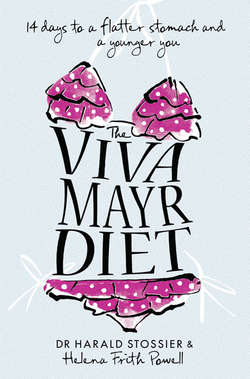Читать книгу The Viva Mayr Diet: 14 days to a flatter stomach and a younger you - Dr Stossier Harald - Страница 42
Look after your proteins
ОглавлениеProteins are an important part of a healthy diet, but you should avoid eating too many. In fact, Dr Stossier suggests that we should eat fish and other animal proteins, such as cheese and meat, a maximum of every second day. Better sources are vegetable proteins, such as pulses, seeds and nuts, which provide us with the amino acids we need in a more easily digested form.
‘People focus too much on proteins because they think they need them to give them energy,’ says Dr Stossier. ‘Eating too many proteins causes our bodies to store them, which means they are not properly digested in the intestine, leading to putrification.’
Putri-what? It sounds disgusting. Dr Stossier explains that putrification, or ‘toxin overload’ as I will call it, is the result of protein being metabolised more by intestinal bacterial overgrowth than by our own digestive enzymes. This is part of a maldigestive process (we’ll go into this in more detail later; see here) that leads to a buildup of toxins in our bodies. These substances have to be eliminated by our metabolic organs (such as the liver and kidneys), or else they will be stored in connecting tissues between your bloodstream and cells. If these get blocked up, then we can’t supply blood to the cells. In turn, the cells produce waste products and we can’t dispose of them, so the waste products are stored. This leads to an overload of toxins, causing heart attack, strokes, rheumatic diseases, diabetes and all sorts of dreadful things. So not only do we have more toxins in our bodies, but our detoxification organs are put under enormous pressure, which compromises their ability to do their jobs effectively. If this all seems a trifle unclear (sorry to mention trifle) then fear not, it will all be explained a little later in the book. Better still, putrification can be avoided, faster than you can learn how to spell it.
To reduce the risk of a toxin overload while eating proteins, and for better digestion, white meat is best, such as turkey, veal and chicken. Lamb follows that, then red meat and last of all pork. Game is somewhere between white and red meat. All fish is fine; eel is slightly fatty, but how often do you come across that? Also bear in mind that cream cheese is more easily digestible than hard cheese (see here for delicious cream-cheese spreads). Some people also find goat’s and sheep’s cheeses easier to digest. Why? Because all milks contain a sugar called lactose. Our bodies have an enzyme known as ‘lactase’, which is used to digest lactose. As we get older, our bodies produce decreasing quantities of this enzyme, which means that we may find it harder and harder to digest milk and milk products. Goat’s and sheep’s milk contains less lactose, so can often be more easily tolerated. And, again, other good sources of protein include pulses (lentils, dried beans and peas, for example), and nuts and seeds. In fact, many other foods, including potatoes, contain some protein, as well as whole grains. So you will be getting more than you think you are, even before you take a bite of that steak.
